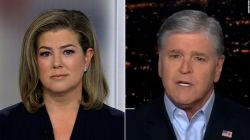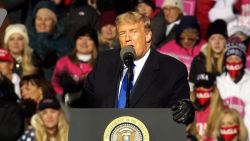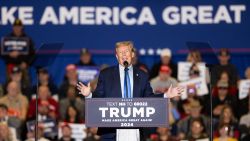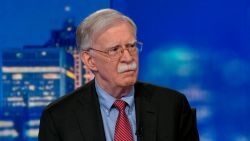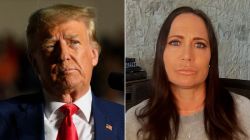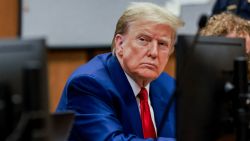Ahead of the next hearings in the impeachment inquiry, House Republicans released a report analyzing the evidence presented thus far. In an effort to undermine the credibility of the original whistleblower complaint, and the legitimacy of the inquiry itself, the report passes off several debunked theories as facts.
Here are a few:
The whistleblower’s accuracy
GOP Report: “The anonymous, secondhand whistleblower complaint misstated details about the July 25 call, which has falsely colored the call’s public characterization.”
Facts First: While some parts of the complaint haven’t been corroborated, the whistleblower’s account of the call has largely been proven accurate. In fact, the rough transcript released by President Donald Trump himself showed that several of the whistleblower’s primary allegations about the call were correct or very close to correct.
In the complaint, the whistleblower alleged that Trump sought to get Ukrainian President Volodymyr Zelensky to investigate Joe Biden, to investigate the conspiracy theory about Democratic computer servers, and to speak to Trump lawyer Rudy Giuliani and Attorney General William Barr. The whistleblower described these requests as pressure, a characterization which the report disputes. However, it’s indisputable that all three of these points are mentioned in the rough transcript of the July 25 call released by the White House.
Secondhand information
GOP Report: “The anonymous whistleblower acknowledged having no firsthand knowledge of the events in question.”
Facts First: This is untrue. The whistleblower stated in the complaint “that he or she possessed both first-hand and other information,” according to Michael Atkinson, the Trump-appointed inspector general for the intelligence community.
In a statement on the process for whistleblowers to file complaints, Atkinson noted that the whistleblower had “direct knowledge of certain alleged conduct.”
Atkinson also explained that the whistleblower was “credible” even about events on which the whistleblower did not have firsthand knowledge, such as the call: “… although the Complainant’s Letter acknowledged that the Complainant was not a direct witness to the President’s July 25, 2019, telephone call with the Ukrainian President, the Inspector General of the Intelligence Community determined that other information obtained during the ICIG’s preliminary review supported the Complainant’s allegations.”
Interference in 2016 election
GOP Report: “Other publicly available information reinforces the conclusion that senior Ukrainian government officials worked in 2016 to support Secretary (Hillary) Clinton.”
Facts First: These claims of a top-down effort by the Ukrainian government to defeat Trump are not supported by the evidence.
The GOP report states as a fact that Ukraine meddled in the 2016 election, even though that was dismissed as a conspiracy theory by several witnesses in the impeachment inquiry and has been refuted by multiple US government investigations.
Some Ukrainian leaders may have hoped that Trump would lose in 2016, but there was no government operation to influence the US election. At least nine witnesses in the impeachment inquiry testified that claims of Ukrainian meddling in 2016 were fabricated by the Russians or unsupported by evidence. Others said they weren’t aware of anything to corroborate these claims. The GOP-led Senate Intelligence Committee looked into potential Ukrainian meddling and found nothing worth pursuing, CNN reported.
In a classified briefing this fall, US intelligence officials told senators that Russia engaged in a years-long campaign to push some of these conspiracy theories, shifting the blame away from Moscow and onto Ukraine for interfering in the 2016 campaign, according to US officials familiar with the briefing. Some of those debunked theories appear in the Republican report.
Unfair impeachment process
GOP Report: “Democrats have abandoned long-standing precedent by failing to guarantee due process and fundamental fairness in their impeachment inquiry.”
Facts First: While Congress did not unanimously adopt the same rules as previous impeachment proceedings, the House did pass a formal impeachment resolution outlining parameters of the inquiry which largely held to the precedents set previously. Furthermore, the impeachment inquiry is a political process, not a criminal case, which means rights like due process are not guaranteed.
The impeachment resolution, H.R. 660, gives equitable cross-examination time to both parties and provides the minority with the right to request witnesses, including through subpoena if necessary. While the ranking minority member’s subpoenas are subject to a veto by a majority vote of the committee, the GOP report notes granting the minority subpoena power in the first place was “against all precedents” when it occurred during the Richard Nixon impeachment inquiry.
The GOP report points to allowing the President or his counsel to participate in all open hearings held by the Judiciary Committee as an example of “procedural fairness.” House Judiciary Chairman Jerry Nadler, a New York Democrat, invited Trump and his counsel to attend the first public hearings before his committee but the White House has declined to attend at this time.
Trump wanted to fight corruption
GOP Report: “Contrary to the assertions in the anonymous whistleblower complaint, the evidence shows that President Trump has a genuine, deep-seated, and reasonable skepticism of Ukraine given its history of pervasive corruption.”
Facts First: Trump showed little interest in fighting corruption before Biden launched his campaign, and official government records suggest Trump was motivated by politics, not Ukraine’s “history of pervasive corruption.”
In public appearances with previous Ukrainian presidents, Trump did not mention anything about corruption. And so far, Trump’s effort to end foreign corruption is only focused on the Bidens. Trump has even defended individuals, like his former campaign chairman Paul Manafort, who profited from corruption in Ukraine.
Furthermore, diplomats appointed by Trump told Ukrainian officials that Zelensky needed to publicly announce the probes, which is very rarely done in legitimate criminal investigations. US Ambassador to the European Union Gordon Sondland even testified that Ukraine didn’t need to actually follow through with the investigations – they only needed to make the public announcement. This strongly suggests the plan was designed to maximize political damage to Biden’s campaign and was not motivated a by a sincere desire to root out corruption.
Under Trump, the State Department has tried to reduce funding for anti-corruption efforts led by the Bureau of International Narcotics and Law Enforcement Affairs. They spent $5 million in 2018 but only requested $3 million for 2019 and again for 2020.
Concerns about a meeting with Ukrainian President Zelensky
GOP Report: “Evidence obtained during the Democrats’ impeachment inquiry shows that the U.S. foreign policy apparatus was divided on the question of whether President Trump should meet with President Zelensky.”
Facts First: This is misleading. It’s true that some National Security Council officials didn’t want Trump and Zelensky to talk right away. But they balked because they were afraid of what Trump might say, not for the reasons mentioned in the GOP report, which implies the concerns were about Zelensky’s potential ties to corrupt officials.
Energy Secretary Rick Perry and Trump-appointed diplomats Kurt Volker and Gordon Sondland pushed for a Trump-Zelensky call in the summer. Top White House advisers John Bolton and Fiona Hill tried to prevent a phone call, which Bolton said was “out of concern that it would be a disaster” if Trump brought up the investigations he wanted Zelensky to launch into his political rivals, according to congressional testimony from US diplomat Bill Taylor.














